Summer 2012 Newsletter
Dear Friends and Colleagues,
In the mid to late 1970’s, domestic violence and sexual assault programs started popping up around Kansas, established first in some of the larger communities and then spreading out across the state. What was clear early on was that women and their children were facing nearly identical issues across the state as they sought help with the battering and rape in their lives. It was as if rapists and batterers had a “playbook” that they shared with each other. But it was also about system issues that had long needed attention. “Fixing this” was going to involve more than providing support to victims. We would also need to speak with one voice in order to implement critical systems changes that would ultimately reduce violence against women.
In 1979, directors from domestic violence programs and sexual assault programs each began meeting separately forming two state level groups: Kansas Organization of Sexual Assault Centers (KOSAC) and Kansas Association of Domestic Violence Programs (KADVP). In 1982, KADVP incorporated, the two organizations later merged, and the Kansas Coalition Against Sexual and Domestic Violence was born. This year we celebrate 30 years of coalition building, collaboration, and progress.
Over the years the coalition has grown to 28 programs that provide advocacy in cities and towns across the state, in both rural and urban areas, and with the support of local communities. KCSDV has also grown, from a part-time director in 1987 working out of a converted garage in a local program, to an organization with 25 full time staff and that owns its own building. The growth has been steady and the work strong. Through the years, KCSDV has had formal collaborations with state agencies, other statewide organizations, and with elected officials. All its partners have been committed to finding ways to reduce violence against women, men, and children. Today, we are a strong, vital coalition of committed advocates working for safety, accountability and justice.
To celebrate its 30 years of advocacy, KCSDV and its coalition of programs will have events across the state. On September 14, we’ll have a reception and open house at our office in Topeka. Please join us. There is much to celebrate!
Sincerely,
Joyce Grover,
Executive Director
Friday, September 14, 2012
4 – 6 p.m.
634 SW Harrison
Topeka, KS
Hear from leaders of each era of our journey. Program emceed by former Kansas Attorney General Bob Stephan will begin at 5 p.m. Before the program, explore the KCSDV offices and learn more about our current work. Food and drinks provided.
RSVP by Friday, August 31st at
reception@kcsdv.org or 785-232-9784.
Visit kcsdv.org for more information.
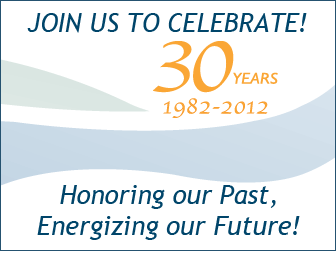
Kansas Legislative Session 2012
The following laws were passed during the 2012 legislative session. Unless otherwise noted, each law will take effect July 1, 2012.
- Provides an option to a victim for extending protection from abuse and protection from stalking orders when the court determines that the defendant has:
- Violated a valid order of protection; or
- Previously violated a valid order of protection; or
- Been convicted of a person felony or an incomplete person felony; AND
- The crime or protection order violation was committed against the plaintiff or a member of the plaintiff’s household.
- States that if the court finds that the victim qualifies for an extended order, the court shall extend a protection order for not less than two additional years and may extend the order up to the lifetime of the defendant.
- Repeals KSA 60-3111 which allowed a victim to only use the protection from abuse process twice in a twelve month period.
- Allows an adult victim of stalking to file the petition for a stalking order with any district judge or court clerk in Kansas.
- Strengthens the penalty for the violation of an extended protection order to a severity level 6, person felony.
- This bill creates a crime for knowingly failing to report the disappearance or death of a child under the age of 13 by a parent, legal guardian or caretaker. The parent, guardian or caretaker is required to report the disappearance as soon as practically possible.
- Established a Batterer Intervention Program Certification Unit at the Attorney General’s office.
- Allows the Attorney General’s office to develop a set of tools, methodologies, requirements and forms for the domestic violence assessment in collaboration with KCSDV and member programs.
- Requires entities or individuals providing batterer intervention services in Kansas to be certified through the Attorney General’s office.
- Requires the supervisor, coordinator or director of the batterer intervention program to be a licensed professional.
- Allows those entities or individuals currently supervising, coordinating, or directing to continue without licensure if they were in that role prior to January 1, 2013.
- Requires those entities and individuals completing domestic violence offender assessments to be licensed professionals.
- Allows those currently completing assessments to continue without licensure if they were in that role prior to January 1, 2013.
- The general Statute of Limitation for crimes in Kansas is five years, excluding murder, terrorism, and some other violent crimes. Under the new bill:
- Time starts to run on the day after the offense is committed except if the offense charged is a sexually violent crime as defined in KSA 22-3717…and the victim was under the age of 18 years of age at the time of the offense, then time shall start to run on the day after the victim’s 18th birthday.
The Kansas Coalition Against Sexual and Domestic Violence is pleased to announce that on June 1, 2012, the Board of Immigration Appeals (BIA), a division of the U.S. Department of Justice, designated KCSDV as an agency with BIA recognition. Additionally, Special Immigrant Legal Advocate Jessica Vanderweide, a member of the Legal Assistance to Victims (LAV) Project, was granted BIA partial accreditation. The accreditation of Ms. Vanderweide authorizes her to prepare and file petitions for immigrant survivors, including VAWA self-petitions, battered spouse waivers, U visas, and T visas.
Federal regulations (see 8 C.F.R. § 292.2) allow some non-profit or charitable organizations to designate a staff member to practice immigration law. BIA recognition and accreditation is the Department of Justice’s certification of nonprofit agencies and staff that allows non-attorney staff to practice limited aspects of immigration law before the U.S. Citizenship and Immigration Services (USCIS) and the immigration courts. Partially accredited representatives like Ms. Vanderweide are able to work, under the supervision of licensed staff attorneys, on immigration petitions before USCIS, a division of the Department of Homeland Security (DHS).
This process was created as a way to increase affordable representation for immigrants who may not have the resources to hire a private attorney. In order to apply for, and be granted agency recognition by the BIA, the agency must demonstrate its institutional knowledge about immigration law, procedures and practice. An agency may apply for recognition and apply for a staff member concurrently to become an accredited BIA representative.
KCSDV recognizes the strong need for low-cost, high quality services for all survivors of sexual assault, domestic violence, dating violence and stalking in Kansas, and addresses it through its LAV, Protection Order, and Immigration Projects. BIA agency recognition for KCSDV and partial accreditation for Ms. Vanderweide allows KCSDV to expand its capacity, and KCSDV member programs’ capacity, to serve immigrant survivors in need of legal advocacy and services.
To learn more about KCSDV’s Legal Assistance to Victims project, contact your local domestic violence and/or sexual assault service provider or call KCSDV at 785-232-9784.
Julie Donelon has said before that MOCSA is the only place that could have made her leave her previous job.
Donelon, MOCSA’s new president and CEO, came to MOCSA in January 2012 after serving for eight years as executive director of the Child Protection Center of Kansas City.
“I’ve always admired MOCSA’s work,” Donelon said. “MOCSA has a much broader scope of helping victims, which attracted me. I get to see the healing side here, where before, I only saw the trauma. Here, I get to witness and be a part of the healing.”
Donelon said she enjoys being a part of something so vital to the community, from the rape-crisis component of MOCSA’s work to the community education. But she said her favorite part about working for MOCSA so far is the people.
“Everyone I’ve met is just fantastic,” she said. “The professionalism, talent and commitment are really impressive.”
It’s no secret that Donelon had some big shoes to fill after former president and CEO Palle Rilinger retired in December after 27 years of service, but Donelon was ready and excited for the challenge.
“Palle is someone I’ve admired since I got into the field,” Donelon said. “She‘s legendary. I’m excited to build upon what she’s already created, and ensure that it is strengthened over time. It is a huge sense of responsibility because I respect her so much.”
One of the personal stories that struck a chord with Donelon after joining MOCSA was about a young woman in her 20s whom a MOCSA advocate met in the hospital after she reported being raped by an acquaintance. The woman had fallen on hard times and was without a job and a place of her own. When the MOCSA advocate gave her the contents of the Assault Survivor Kit provided by the Assistance League of Kansas City, the woman was overcome with gratitude. She admitted to the advocate that she had very little clothing, some of which had just been taken as evidence. She said thank you for each item as she pulled out the new clothes, socks, toothbrush and other toiletries.
“That was really eye-opening for me,” Donelon said. “I really don’t know what some people would do without MOCSA.”
When she’s not busy at work, Julie is an avid runner. She’s currently training to run a half-marathon in April, and enjoys daily jogs with her two labs, Attie and Scout, named after her favorite “To Kill a Mockingbird” characters. She also enjoys spending time with her husband and her family, including her two young nieces.
Learn more at www.mocsa.org.
(This article re-printed with approval from MOCSA Spring 2012 Newsletter)
The end of June wraps up another jam-packed year of trainings facilitated or coordinated by KCSDV.
From July 2011 through June 2012, KCSDV provided 77 in person trainings and 51 webinars training a total of 2,854 participants! In-person participants included 583 member program advocates and 1,201 professional allies. Webinar attendees included 539 member program advocates and 531 professional allies. Other than member program advocates, professions represented at KCSDV trainings included attorneys, law enforcement, child welfare, mental health, substance abuse, and health care professionals.
Highlights from the year include several nationally recognized facilitators brought to Kansas by KCSDV and new trainings developed by KCSDV Staff to better serve member programs and the systems that serve survivors in Kansas, particularly as a part of KCSDV’s Trauma Project and SANE/SART Project.
KCSDV’s Collaboration with

(aka – KCSDV’s Trauma Project)
The Kansas Coalition Against Sexual and Domestic Violence was selected as a target site by the National Center on Domestic Violence, Trauma and Mental Health in 2009 for intensive technical assistance and training in the area of trauma and trauma informed services. Since 2009, KCSDV staff has worked with the National Center on a number of projects to build capacity amongst advocacy programs and allies for a trauma informed approach to survivor centered services in Kansas.
Based on needs identified by Kansas programs in a 2010 needs assessment survey, KCSDV has incorporated and integrated trauma and trauma-informed work into its recurring trainings for advocates and allied professionals. In 2011 and 2012, KCSDV presented webinars and/or trainings specific to working with survivors who use substances, working with survivors with mental illness, understanding and responding to suicidal risk and ideation for advocates, and responding to survivors of multi-abuse trauma. KCSDV has also gathered and/or purchased materials and resources related to trauma for use by staff and for check out by programs through its resource library.
Additionally, KCSDV incorporates information on trauma into other project-specific or discipline-specific trainings (e.g., law enforcement training on Sexual Assault). In 2011 and 2012, in collaboration with other grant projects, the Coalition was able to bring Dr. Janine D’Anniballe, Olga Trujillo, Laura Vandernoot Lipsky, Judith Avner, and Sarah DeWard to Kansas for statewide trainings which reached over 500 sexual assault and domestic violence advocates, mental health and substance abuse providers, SRS employees, and disability services providers, attorneys, and criminal justice professionals. Trainings focused on understanding trauma from a bio-physiological perspective, trauma and mental health, vicarious trauma, and the intersection of traumatic brain injury and domestic violence. In addition to the statewide trainings, in August 2011, Carole Warshaw and Terri Pease from the National Center on Domestic Violence, Trauma and Mental Health provided training and technical assistance on trauma informed services and reflective supervision to program directors and some coalition staff. As follow up to that training, the Coalition is working on a supervisor’s curriculum that will include reflective supervision practices and principles.
On the “home front,” KCSDV has made a commitment to foster a culture that appreciates and recognizes the need for self-care, for slowing down and for being present. Changes were made to the facilitation of monthly all-staff meetings, a gratitude board is now located in a high-traffic area where all staff and visitors can post and view messages, and a Wellness Committee has been formed to assess the current wellness and work/life balance concerns of staff and explore ways that KCSDV can adjust and/or respond. These changes are the first steps in KCSDV’s efforts to be more reflective of trauma informed practices. Because of the success of the project, KCSDV was selected to attend the Train the Trainer conference by the National Center in September of 2012 to become a mentoring Coalition to other state sexual assault and domestic violence coalitions looking to increase their own capacity to enhance trauma informed services in their states. Two staff will attend that meeting and the Coalition will continue to work collaboratively with the National Center as it moves forward in improving capacity to do trauma-informed work in Kansas.
Since May 2009, KCSDV has coordinated the Kansas SANE/SART project. A SANE, Sexual Assault Nurse Examiner, is a specially trained registered nurse who provides comprehensive care to victims of sexual assault. A SART, Sexual Assault Response Team, is a community-based coordinated response to sexual assault. The community team includes representatives from health care providers, advocacy programs, law enforcement agencies, prosecutors’ offices as well as any other professionals that serve victims of sexual violence in the community.
As a part of its role as SANE/SART coordinating agency, KCSDV provides technical assistance and training to SANE programs and SARTs all across Kansas, particularly in communities where new forensic nursing programs are starting or where capacity building is needed or requested.

KCSDV facilitated this year’s first 40-Hour SANE-SART Adult/Adolescent Course in Topeka on March 5-9. Thirty participants, including nurses, advocates, law enforcement officers, corrections personnel, and an assistant county attorney, attended the training. Participants came from a variety of communities around the state,including Augusta, Chanute, Dodge City, El Dorado, Gardner, Hutchinson, Lawrence, Leavenworth, Overland Park, Olathe, Pittsburg, Rose Hill, Wichita, Winfield and Yates Center. Other training participants traveled from Missouri, Nebraska, Oklahoma, and New York.
The 40-hour course provides comprehensive information about victim-centered responses to sexual assault. Multiple presenters provided expertise in many areas, including the dynamics of sexual assault, the prevalence of sexual violence, reporting options in Kansas, and identifying the roles and responsibilities of each SART member. In addition, information was provided about medical/forensic evaluations, drug-facilitated sexual assaults, nursing management, professional and ethical conduct, courtroom skills, cultural competency, and much more.
Joy Thomas, SANE Coordinator at Stormont Vail Hospital in Topeka, also coordinated a tour of Stormont Vail’s SANE facility, giving participants a first-hand view of this long-term project.
The next 40-Hour SANE-SART Adult/Adolescent Course is scheduled for fall 2012 in Wichita or Newton.
KCSDV has updated the Pediatric Course from a 24-hour course to a 40-hour course. The course now includes 15 hours of online modules to be completed prior to the 25 hours of classroom coursework. The course was offered for the first time May 1-3, 2012 in Wichita with nurses from nine Kansas communities attending.
The changes made will ensure that KCSDV meets current education guidelines set forth by the International Association of Forensic Nurses (IAFN) and also required for SANE-P certification by IAFN and the Forensic Nursing Certification Board. For more information about this course, contact KCSDV’s Statewide SANE-SART Coordinator Shirley Fessler at sfessler@kcsdv.org or 785-232-9784.
KCSDV provides technical assistance to DV/SA programs and allied professionals in Kansas. This is the technical way to say that you can call or email us…and many people do. In the last fiscal year (July 2011 – June 2012) KCSDV received 3,720 such contacts. This is up slightly from our three-year average of 3,250 contacts (or TA calls, as we call them). A majority of these calls came from staff and advocates at the 29 community-based domestic violence and sexual assault programs across the state. The full break down of incoming requests is as follows:
1. DV/SA Program Staff/Advocates – 2242
2. Criminal Justice (incl. Law Enforcement & Attorneys) – 707
3. Unaffiliated Individuals – 429
4. Government Agencies – 94
5. Health Care Professional (incl. Mental Health) – 89
6. Other Non-governmental Organizations – 82
7. Media/Reporters – 77
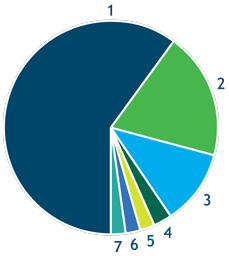
KCSDV published two new resources this spring designed to improve services to immigrant and limited-English-proficient survivors.
KCSDV’s U Visa Manual for Law Enforcement, Prosecutors, and Judges provides an overview of U visas and practical guidance and tips for law enforcement officers, prosecutors, and judges in filling out and signing U visa certifications of helpfulness. Congress created the U visa in 2000 as a tool to help law enforcement and prosecutors be better able to investigate and prosecute serious crimes committed against immigrants.
Immigrants lacking stable immigration status and fearing removal (deportation) are often reluctant to report crimes committed against them, including domestic and sexual violence. U visas are temporary visas that offer lawful immigration status and work authorization for immigrants who suffer substantial mental or physical harm as the result of being the victims of certain types of serious crimes and who are helpful to the authorities in the investigation or prosecution of the criminal activity.
A required piece of a U visa application is a certification form signed by an agency with investigative or prosecutorial authority that the applicant is a victim of qualifying criminal activity, has information about the crime, and was or is likely to be helpful in the investigation or prosecution.
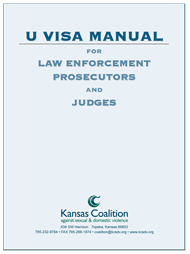
KCSDV’s U Visa Manual for Law Enforcement, Prosecutors, and Judges, available in print and electronic versions, will be distributed to more than 200 law enforcement agencies, prosecutors, and judges across Kansas. It includes information and guidance addressing:
- Which agencies and officers can sign U visa certifications
- Section-by-section tips on completing a U visa certification form
- Scenarios illustrating a victim’s helpfulness at different points in the criminal, civil, and juvenile justice system
- Frequently asked questions about U visas and U visa certifications
- Relevant statutes, regulations, and Congressional Purpose and Findings
- A chart of potentially qualifying crimes under Kansas law
- A quick reference sheet with U visa eligibility requirements and certification tips
For more information on this manual or to request a copy, contact KCSDV Immigration Project Attorney Kursten Phelps at kphelps@kcsdv.org or by calling 785-232-9784.
Survivors with limited English Proficiency also often face challenges in accessing everyday services, information, and help. KCSDV recognizes the need to address language access both on a systemic level as well as on an individual level to ensure sexual and domestic violence service in Kansas are accessible to all survivors, regardless of their language ability. Because of this KCSDV has produced the Working Together to Meet Language Access and Limited English Proficient (LEP) Needs of Survivors: A Resource Guide and Toolkit for Interpreters and Sexual and Domestic Violence Advocacy Programs in Kansas (Resource Guide and Toolkit). The Resource Guide and Toolkit is designed to help Kansas sexual and domestic violence advocacy programs:
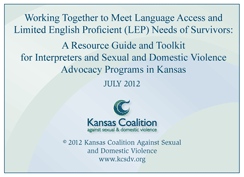
- Understand the requirements and importance of providing language access to survivors;
- Work with and provide information to interpreters on issues of sexual assault, domestic violence, dating violence and stalking; and
- Have tools and resources that can be used to provide meaningful language access and advocacy services to LEP survivors.
In addition, the Resource Guide and Toolkit is designed to help interpreters:
- Understand the issues of sexual assault, domestic violence, dating violence and stalking and the services sexual and domestic violence advocacy programs provide for survivors and their children;
- Identify and address ethical obligations and confidentiality requirements when working with sexual and domestic violence advocacy programs; and
- Have tools and resources that can be used to provide meaningful access and interpretation services on behalf of LEP survivors of sexual assault, domestic violence, dating violence, and stalking.
- For more information on this toolkit, contact KCSDV Rural Outreach Projects Manager/Special Immigrant Legal Advocate Jessica Vanderweide at jvanderweide@kcsdv.org or call 785-232-9784.
Jessica Haymaker joins KCSDV this July as the Rural Sexual Assault Coordinator. Jessica comes to KCSDV after graduating with her Masters in Social Work from the University of Kansas. Previously, Jessica worked at the The Crisis Center, Inc. in Manhattan, KS, which is a community-based provider or sexual and domestic violence services. Jessica has also volunteered her time as a social worker at Truman Medical Center and Rose Brooks Center, both in Kansas City, MO. Jessica graduated with her Bachelor’s degree from Kansas State University.
Becky Price joined KCSDV in June as the Development Coordinator. Becky comes to us from Kansas Big Brothers Big Sisters where she worked the last 25 years in several leadership roles and has successfully implemented many fund raising strategic plans both in rural and urban communities. She has completed the advocate training at WTCS (now The Willow Domestic Violence Center) in Lawrence, volunteered for a Rape Crisis Center in Washington and has many years of experience with victim / offender mediation.
Melena Levi-Kaufman recently accepted the Rural Collaboration Coordinator position with KCSDV. As the Rural Collaboration Coordinator, Melena will be coordinating and working closely with rural DV/SA advocacy programs and other KCSDV staff and projects to develop programming, best practice strategies, protocols, and training curricula for responding to the needs of rural survivors of sexual assault, domestic violence, and stalking. She previously served as KCSDV’s Director of Economic Projects. KCSDV’s Economic Projects Division coordinated the collaborative project known as OARS (Orientation Assessment Referral Safety) with the Kansas Department of Social and Rehabilitation Services as well as projects involving financial literacy, poverty, homelessness, and housing issues.
Mallory Rousseau has been promoted to the position of Prevention Projects Coordinator as of May 2012 and will be overseeing the CDC-funded DELTA project at the state level. Prior to accepting this position, Mallory worked at KCSDV as the Administrative Assistant and Prevention Projects Assistant. Mallory graduated from the University of Kansas in 2011 with bachelor’s degrees in both Sociology and Women’s Studies.
“There is a cost to interacting with suffering.”
As advocates, survivors, and those who serve survivors, we daily witness other’s pain, which can result in our vicarious trauma. It’s also known as burnout, compassion fatigue or secondary trauma. Such trauma is “the cumulative toll of being exposed to the suffering of other humans, living beings, or the planet.”
For DV/SV advocates and programs, our challenge and “part of the brutality in doing this work is that there’s an increasing need among people, animals and the planet and, at the same time, decreasing resources […] Inevitably you will be faced with the very difficult challenge of trying to hold on to your dedication and commitment while simultaneously trying not to get attached to the outcome in a way that is detrimental.”
From Lauren Van Dernoot Lipsky (see interview at:
http://www.joyfulheartfoundation.org/reunion/issue02/index.html).
Ms. Van Dernoot Lipsky also co-authored Trauma Stewardship, an Everyday Guide to Caring for Self While Caring for Others with Connie Burk. In her interview and book, she addresses the signs of vicarious trauma, which look similar to the trauma responses of survivors. Refreshingly, she takes advocate self-care further than bubble baths. While a soak in the tub could definitely be an important part of some folks’ self-care plans, often times, our conversations around advocate self-care don’t go further than the suds: they don’t acknowledge the complexities, challenges and essentially of holistic advocate self-care. For example, she explores how the “suck-it-up ethos” – the idea that one is less dedicated to the cause if one puts in place healthy boundaries — can inhibit honest discussions about advocate self-care. She offers many suggestions for how programs can create safe spaces for all of their staff’s self-care. Reading this interview could be the start of new self-care plan for you.
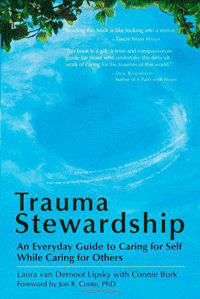
KANSAS CRISIS HOTLINE: 888-END-ABUSE | 888-363-2287